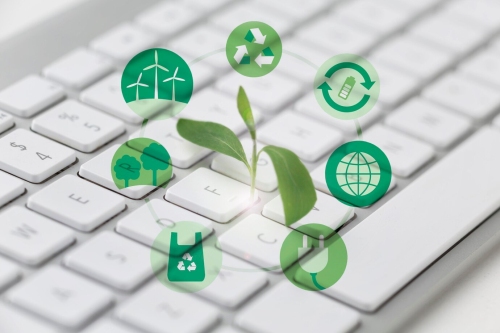Regeneration | Jan 22, 2024
Transformative Business Strategies for 2024. A Call for Regenerative Business Practices at Davos 2024
At the 2024 World Economic Forum in Davos, a new narrative in sustainable business emerged, focusing on regeneration rather than mere sustainability.
Business leaders are now recognizing that to thrive in a climate-impacted world, it's not enough to merely reduce harm; instead, there's a need to create a positive impact.
A Pew Research Center survey of 8,842 U.S. adults in late 2023 reveals that 63% believe climate change impacts in the U.S. will worsen in their lifetimes. While most anticipate making minor sacrifices due to climate change, only a smaller portion foresee major lifestyle changes.
- The survey highlights a partisan divide: 88% of Democrats versus less than half of Republicans expect to make sacrifices due to climate change.
- The public views the energy industry and large businesses as more capable of combating climate change than individuals.
- Despite the lower ranking of climate change compared to other national issues, there's strong support for U.S. involvement in global efforts to mitigate it.
See: How Open Banking is a Game-changer for Sustainability
A growing number of corporate leaders are witnessing the impact of severe weather conditions on their financial performance. According to a Deloitte survey conducted in 2022, a striking 97% of executives worldwide reported that their businesses have suffered adverse effects from climate change, including significant disruptions in their supply chains.
The focus of sustainable business has shifted towards regeneration
This new approach goes beyond merely responding to climate change; it involves creating proactive, positive impacts.
Gim Huay Neo, managing director of the World Economic Forum Geneva:
"We have to build new economic models, new businesses and possibly new lifestyles or humanity that are just as good, or even better, than what we have today. This regeneration approach is not just about tweaking existing models but rethinking and reinventing business practices to create a positive impact, moving towards sustainability that benefits both the environment and the economy."
Integrating 2024 Sustainability Trends into Business Practices
Incorporating the latest sustainability trends into business practices is crucial for companies, both large and small, in 2024.
1. Businesses must embed sustainability into their core strategies, aligning profitability with societal impact through economically viable and socially responsible business models, while staying ahead of regulatory changes for compliance and responsible conduct, including adapting to new sustainability reporting requirements and legal drivers.
See: Canadian Banks Face Scrutiny Over Sustainability Claims
2. Collaboration is essential, with companies forming alliances across industries, governments, and civil society to address sustainability challenges, drive innovation, and share best practices, alongside preparing for new regulatory disclosure requirements on their environmental impact and leveraging technology for data collection and analysis.
3. Genuine stakeholder engagement is key, moving beyond simple solutions to impactful collaborations and initiatives, ensuring board diversity translates into real environmental and social impact, prioritizing employee well-being and mental health within corporate culture, and requiring CEOs to balance public positions on social and political issues with stakeholder expectations and potential risks.
Outlook
Companies, small and big, are advised to incorporate sustainability and regenerative strategies into their business practices and join this transformative movement. By doing so, your company will not only align with the growing global demand for environmental responsibility but also reap the benefits of increased resilience, innovation, and customer loyalty. Embrace these strategies to ensure long-term profitability and a positive impact on both society and the planet. Act now to lead the change towards a sustainable future and set a benchmark in your industry.

 The National Crowdfunding & Fintech Association (NCFA Canada) is a financial innovation ecosystem that provides education, market intelligence, industry stewardship, networking and funding opportunities and services to thousands of community members and works closely with industry, government, partners and affiliates to create a vibrant and innovative fintech and funding industry in Canada. Decentralized and distributed, NCFA is engaged with global stakeholders and helps incubate projects and investment in fintech, alternative finance, crowdfunding, peer-to-peer finance, payments, digital assets and tokens, artificial intelligence, blockchain, cryptocurrency, regtech, and insurtech sectors. Join Canada's Fintech & Funding Community today FREE! Or become a contributing member and get perks. For more information, please visit: www.ncfacanada.org
The National Crowdfunding & Fintech Association (NCFA Canada) is a financial innovation ecosystem that provides education, market intelligence, industry stewardship, networking and funding opportunities and services to thousands of community members and works closely with industry, government, partners and affiliates to create a vibrant and innovative fintech and funding industry in Canada. Decentralized and distributed, NCFA is engaged with global stakeholders and helps incubate projects and investment in fintech, alternative finance, crowdfunding, peer-to-peer finance, payments, digital assets and tokens, artificial intelligence, blockchain, cryptocurrency, regtech, and insurtech sectors. Join Canada's Fintech & Funding Community today FREE! Or become a contributing member and get perks. For more information, please visit: www.ncfacanada.org Related Posts
- SEO Powered Content & PR Distribution. Get Amplified Today.
- PlatoData.Network Vertical Generative Ai. Empower Yourself. Access Here.
- PlatoAiStream. Web3 Intelligence. Knowledge Amplified. Access Here.
- PlatoESG. Carbon, CleanTech, Energy, Environment, Solar, Waste Management. Access Here.
- PlatoHealth. Biotech and Clinical Trials Intelligence. Access Here.
- Source: https://ncfacanada.org/sustainable-business-and-the-regenerative-future/
- :has
- :is
- :not
- 150
- 200
- 2018
- 2023
- 2024
- 22
- 300
- 8
- a
- About
- According
- across
- Act
- address
- adults
- adverse
- advised
- affiliates
- ahead
- align
- Alliances
- alongside
- also
- alternative
- alternative finance
- analysis
- and
- anticipate
- approach
- ARE
- artificial
- artificial intelligence
- AS
- Assets
- At
- Balance
- Banking
- Banks
- bbc
- become
- believe
- Benchmark
- benefits
- BEST
- best practices
- Better
- Beyond
- Big
- blockchain
- board
- both
- build
- business
- business practices
- businesses
- but
- by
- cache
- call
- Canada
- Canadian
- capable
- Center
- CEOs
- chains
- challenges
- change
- Changes
- civil
- claims
- Climate
- Climate change
- closely
- collaboration
- collaborations
- collection
- combating
- community
- Companies
- company
- compared
- conditions
- Conduct
- conducted
- Core
- Corporate
- Corporate Culture
- create
- Creating
- Crowdfunding
- crucial
- cryptocurrency
- Culture
- customer
- data
- davos
- decentralized
- deloitte
- Demand
- Democrats
- digital
- Digital Assets
- Director
- disruptions
- distributed
- Diversity
- divide
- doing
- drive
- drivers
- due
- Economic
- Economic Forum
- economy
- ecosystem
- Education
- effects
- efforts
- embed
- embrace
- emerged
- Employee
- energy
- engaged
- engagement
- enough
- ensure
- ensuring
- Environment
- environmental
- essential
- Ether (ETH)
- Even
- executives
- existing
- expect
- expectations
- Face
- finance
- financial
- financial innovation
- financial performance
- fintech
- Focus
- For
- foresee
- Forum
- from
- funding
- funding opportunities
- future
- game-changer
- Geneva
- get
- Global
- Goes
- good
- Government
- Governments
- Growing
- Half
- harm
- Have
- helps
- High
- highlights
- http
- HTTPS
- Humanity
- icons
- image
- Impact
- impactful
- Impacts
- in
- Including
- incorporate
- increased
- industries
- industry
- information
- initiatives
- Innovation
- innovative
- instead
- Insurtech
- Intelligence
- into
- investment
- involvement
- involves
- issues
- IT
- Jan
- join
- jpg
- just
- large
- Late
- latest
- lead
- leaders
- Legal
- less
- leveraging
- lifestyle
- lifestyles
- long-term
- lower
- major
- make
- Making
- managing
- Managing Director
- Market
- max-width
- member
- Members
- mere
- merely
- minor
- Mitigate
- models
- more
- most
- movement
- moving
- NARRATIVE
- National
- Need
- networking
- New
- now
- number
- of
- on
- only
- open
- open banking
- opportunities
- or
- Other
- over
- partners
- payments
- peer to peer
- performance
- perks
- PEWRESEARCH
- planet
- plato
- Plato Data Intelligence
- PlatoData
- please
- portion
- positions
- positive
- possibly
- potential
- practices
- preparing
- prioritizing
- Proactive
- profitability
- projects
- provides
- public
- Ranking
- rather
- real
- reap
- recognizing
- reduce
- regeneration
- regenerative
- Regtech
- regulatory
- Reported
- Reporting
- Republicans
- research
- resilience
- responding
- responsibility
- responsible
- Reveals
- risks
- s
- scrutiny
- Sectors
- Services
- set
- severe
- Share
- shifted
- significant
- Simple
- small
- smaller
- So
- Social
- Social impact
- socially
- societal
- Society
- Solutions
- stakeholder
- stakeholders
- Stewardship
- strategies
- strong
- supply
- Supply chains
- support
- Survey
- Sustainability
- sustainable
- sustainable future
- Technology
- than
- that
- The
- the world
- their
- There.
- These
- this
- thousands
- Thrive
- Through
- to
- today
- Tokens
- towards
- transformative
- Trends
- tweaking
- u.s.
- Versus
- viable
- vibrant
- views
- Visit
- we
- Weather
- What
- while
- will
- with
- within
- witnessing
- works
- world
- World Economic Forum
- worldwide
- worsen
- Your
- zephyrnet













